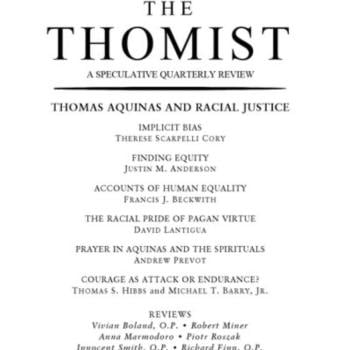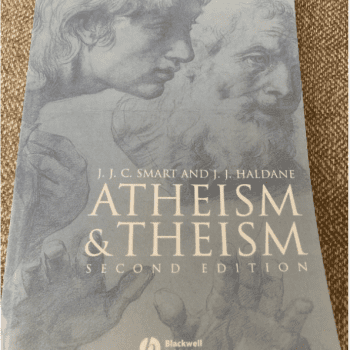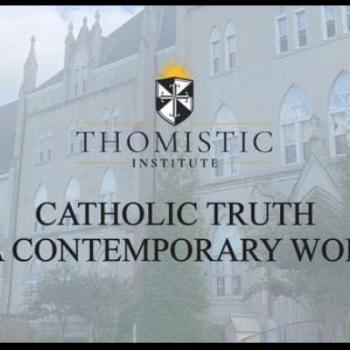I am grateful to be a contributor to a festschrift honoring the Jewish philosopher David Novak: The Achievement of David Novak: A Catholic-Jewish Dialogue. Just published by Pickwick Publications (an imprint of Wipf and Stock), the book is edited by Matthew Levering and Tom Angier. My chapter–entitled “A Christian Account of Why David Novak Is Right about the Same-God Question”–deals with the question of whether Christians, Muslims, and Jews worship the same God. It’s a topic I’ve addressed in several places over the past five years or so, including chapter 3 of my latest book Never Doubt Thomas (Baylor University Press, 2019) and my contributions to the edited volume Do Christians, Muslims, and Jews Worship the Same God? Four Views (HarperCollins, 2019). My arguments in both books grew out of two popular pieces I published in The Catholic Thing in December 2015 and January 2016, both of which I authored in defense of a Wheaton College political science professor, Larcyia Hawkins, who had been strongly criticized for writing on her Facebook wall that she believed that Christians and Muslims worshiped the same God.
In this 2021 chapter in the Novak festschrift I add something new to my case. I argue that the way in which virtually all major Christian apologists defend their faith entails that Christians, Muslims, and Jews worship the same God. What follows is the entirety of that new argument as it appears in the book chapter (footnotes removed).
Since the mid-twentieth century, there has been a renaissance of Christian apologetics, mostly, though not exclusively, among Protestants who identify as Evangelical. (Ironically, C. S. Lewis, a traditional Anglican, is the writer often credited as being the most influential figure in launching this renaissance.) As far as the same God question goes, the most dominant methodology found in this
apologetic literature should lead one to an affirmative answer. To see why, let us consider the works of several leading Christian apologists.
In his book, Reasonable Faith, Evangelical philosopher William Lane Craig makes a case for the truth of Christian theism. After addressing the relationship between faith and reason and then arguing for the absurdity of life without God, in the next two chapters he defends the rationality of belief in God. One of the arguments he offers is the kalām cosmological argument, whose proponents include the Muslim philosopher Al-Ghazali (1058–1111). Craig concludes that the argument shows that “a personal Creator of the universe exists, who is uncaused, beginningless, changeless, immaterial, timeless, spaceless, and unimaginably powerful. This, as Thomas Aquinas was wont to remark, is what everybody means by ‘God.’” Following his two chapters on God’s existence Craig then moves on to defend the possibility of both historical knowledge and miraculous events as well as the reality of both Jesus’s self-understanding as divine and the historicity of his resurrection
Now suppose we had a time machine and we could transport Ghazali to the year 2019, give him an Arabic translation of Reasonable Faith, and ask him to read it. It is not difficult to imagine after reading Craig’s book he would tell us that he is delighted that Craig has published a powerful rendition of his kalām argument. But, as a good Muslim, Ghazali would likely go on to say something like the following: “Although I agree with Craig that my argument establishes that ‘a personal Creator of the universe exists, who is uncaused, beginningless, changeless, immaterial, timeless, spaceless, and unimaginably powerful,’ I think that Craig is mistaken about Jesus’s divinity and resurrection.” Consequently, it cannot be the case that Ghazali and Craig—and by default Muslims, Christians, and Jews—are not referring to the same God, though each believes different things about that one God and his revelation in history. (Ironically, Craig does not once in his book offer a defense of God’s tri-unity, even though the book’s subtitle is Christian Truth and Apologetics).
Craig’s apologetic procedure is fairly typical among Christian thinkers. In Mere Christianity Lewis first introduces the reader to the concept of the one true God by way of the moral law, distinguishing that concept from the God of pantheism and calling the view “held by Jews, Mohammedans and Christians.” Lewis identifies this God as the one who “made the world—that space and time, heat and cold, and all the colours and tastes, and all the animals and vegetables, are things that God ‘made up out of His head’ as a man makes up a story.” It is only later in Mere Christianity that Lewis explains to the reader the idea of Jesus as divine and the doctrine of the Trinity. J. P. Moreland, in his Scaling the Secular City, spends considerable space defending the existence of God before moving on to distinctly Christian concerns, including the historicity of the New Testament and the resurrection of Jesus. At the end of his chapter on cosmological arguments for God’s existence, Moreland concludes that “it is most reasonable to believe that the universe had a beginning which was caused by a timeless, immutable agent[,] . . . that the world had its beginning by the act of a person.” And like Craig, Moreland does not offer a defense of the Trinity. One finds similar treatments in the works of Stuart C. Hackett (The Reconstruction of the Christian Revelation Claim) and Norman L. Geisler (Christian Apologetics). Prior to offering direct defenses of Christian claims about Christ and Scripture, Hackett and Geisler each establishes the existence of God. Hackett defines “God as an absolutely necessary Being, characterized by personal intelligent will, and constituting essential or absolute Goodness—a Being, furthermore, whose relation to the contingent world order . . . is that of creative Causality, sustaining Ground, and providential Direction, while at the same time this Being transcends in existence and nature that world order of which it is thus the ultimate foundation.” Geisler, an Evangelical Thomist, maintains that if Aquinas’s principle of existential causality is sound, then there must exist an Uncaused Cause who is “Infinite, Unchanging, All-Powerful, All-Knowing, and All-Perfect.” The great Reformed Christian philosopher, Alvin Plantinga (Warranted Christian Belief), though not including natural theology as part of his case for Christian belief as one finds in thinkers like Craig, Lewis, Moreland, Hackett, and Geisler, nevertheless argues, following John Calvin, that God has implanted in human beings a sensus divinitatis, “a disposition or set of dispositions to form theistic beliefs in various circumstances, in response to the sorts of conditions or stimuli that trigger the working of this sense of divinity.” So, for example, “you see the blazing glory of the heavens from a mountainside at 13,000 feet; you think about those unimaginable distances; you find yourself filled with awe and wonder, and you form the belief that God must be great to have created this magnificent heavenly host.” This God, according to Plantinga, is “the all-powerful, all-knowing creator of the universe . . . with properties of being infinite, transcendent, and ultimate.” Plantinga calls this the “theistic component” of Christian belief, distinguishing it from “the uniquely Christian component,” which includes such doctrines as Jesus’s resurrection and his divine sonship.
If the arguments for God’s existence offered by Craig, Lewis, Moreland, Hackett, and Geisler could be accepted by a devout Jew or Muslim, and if Plantinga is right that God has implanted in human beings a sensus divinitatis that under the appropriate conditions triggers belief in the same God that may be arrived at by the arguments of natural theology, then it seems that Christians, Jews, and Muslims worship the same God, even if they disagree over what Plantinga calls the “unique Christian component.” Thus, by first securing the reference to God, the Christian apologist establishes that Christians, Jews, and Muslims share the same understanding of what constitutes a divine nature, despite the fact that their beliefs diverge as a result of what each group accepts (or rejects) as specially revealed truths about God found in its inspired scripture (or the other groups’ inspired scripture).
If you are interested in reading the entire chapter, you can find it in the book.












